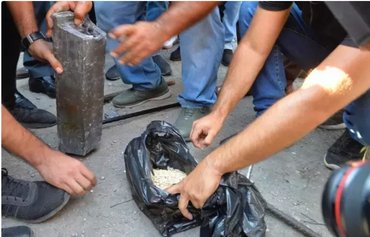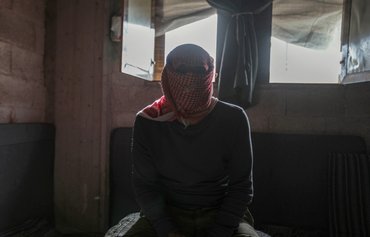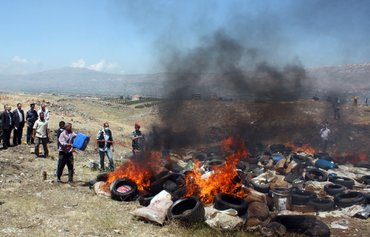BEIRUT -- Trade in the amphetamine-like stimulant Captagon in the Middle East grew exponentially in 2021 to top $5 billion according to a new report, which identifies Syria as the main producer of the illegal drug.
Research by the New Lines Institute, released Tuesday (April 5), paints an alarming picture of the impact booming Captagon production is having on the health and security of the region.
"The Captagon trade is a rapidly growing illicit economy in the Middle East and Mediterranean," the report said. "Based on large-scale seizures alone, the potential value of the retail trade in 2021 is estimated at over $5.7 billion."
The figure is a jump from an estimate of around $3.5 billion in 2020 and only reflects the retail value of the pills seized last year, which the think-tank tabulated at more than 420 million.
![This picture taken March 1 shows a cache of Captagon pills seized by the Directorate of Narcotics Control of Saudi Arabia's Interior Ministry during a special operation, displayed in Jeddah. [Fayez Nureldine/AFP]](/cnmi_di/images/2022/04/06/34864-captagon-bust-ksa-600_384.jpg)
This picture taken March 1 shows a cache of Captagon pills seized by the Directorate of Narcotics Control of Saudi Arabia's Interior Ministry during a special operation, displayed in Jeddah. [Fayez Nureldine/AFP]
The real amount of seized pills is likely higher and still only a fraction of the total amount of Captagon produced, according to the report.
Saudi crackdown on drugs
Many countries have not divulged aggregated seizure figures for the drug, of which Saudi Arabia is the main consumer.
The kingdom has been making a concerted effort to crack down on drug smuggling in recent years, and on Friday thwarted yet another attempt to smuggle Captagon pills into the country, Al-Monitor reported.
More than 1.5 million pills were hidden in trucks at the al-Haditha border crossing with Jordan, and four people were arrested in relation to the incident, it said.
Earlier this year, Jordanian border guards killed 27 drug smugglers as they tried to enter simultaneously from various locations in Syria under the cover of snow.
In the past six years, Saudi authorities have thwarted "attempts to smuggle more than 600 million amphetamine pills" from Lebanon alone, said General Directorate of Narcotics Control spokesman Maj. Mohammed al-Nujaidi.
In a previous interview with Al-Mashareq, he accused Lebanese Hizbullah of being "the main source smuggling them and manufacturing them".
Captagon is almost exclusively produced and consumed in the Middle East, with its changing formula making it harder to track the patterns of production, smuggling and use and crack down on the booming trade.
It has been concealed inside shipments of oranges and pomegranates and inside furniture, among other guises, and is now a brand name, with its trademark logo sporting two interlocked "Cs" embossed on each tablet.
Syrian regime's role
The market value of the Captagon produced in Syria now far outstrips that of legal exports and has resulted in the country being branded a "narco-state", according to the New Lines Institute report.
The report further documents how members of Syrian President Bashar al-Assad's family and high-ranking members of his regime are involved in Captagon manufacturing and smuggling.
Faced with international sanctions, including the Caesar Syria Civilian Protection Act, which is designed to hold al-Assad's regime accountable for its brutality, Syria is "using the trade as a means for political and economic survival", the report said.
Last year, Al-Mashareq reported, Hizbullah moved the nexus of its narcotics operation into Syria, exploiting the lawlessness in regime-controlled areas and the lower operating costs to set up drug trafficking and manufacturing hubs.
According to a March 2021 Syrian Observatory for Human Rights estimate, there are about 14 factories producing illegal drugs in Syria.
The drugs produced in Syria are sold far and wide, the Observatory said, with heavy consumption evident in regime-controlled areas and trafficking operations delivering drugs to other parts of Syria and outside the country.
Lebanese Shia activist Hussein Ataya told Al-Mashareq that Hizbullah "established its statelet for drug manufacturing inside Syria", sharing control of the drug manufacturing operation with units of the regime's 4th Division.
The 4th Division, whose primary purpose is to defend the regime from internal and external threats, is led by al-Assad's brother, Brig. Gen. Maher al-Assad.
Disagreements between Hizbullah and the 4th Division escalated earlier this year, as tensions roiled over the division of profits generated from drug and fuel smuggling operations, and the 4th Division's pursuit of territorial control.
Lebanon key transit point
Some Captagon production facilities, albeit smaller ones, are located in Lebanon, already the world's third-largest hashish exporter after Morocco and Afghanistan.
"Lebanon has served as an extension of the Syrian Captagon trade, a key transit point for Captagon flows," the New Lines Institute report said.
Syrian regime figures are benefitting from various allied militias and proxies in organising the trade, including Hizbullah, it said.
Some of the party's main areas of influence include a significant stretch of the Syrian-Lebanese border, giving it a key role in regional trafficking.
"With its history of controlling Lebanese cannabis production and smuggling out of the southern Bekaa Valley, Hizbullah has seemingly served an important supporting role in the Captagon trade," the report said.

![In this file photo taken December 29, a man shows fake oranges filled with Captagon pills hidden in boxes containing real fruit, after the shipment was intercepted by the customs and anti-drug brigade at the Beirut port. [Anwar Amro/AFP]](/cnmi_di/images/2022/04/06/34863-captagon-pills-orange-600_384.jpg)






